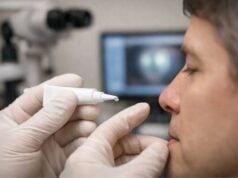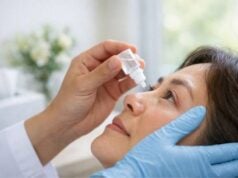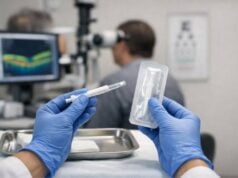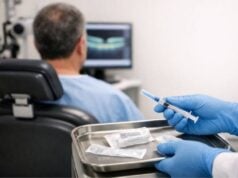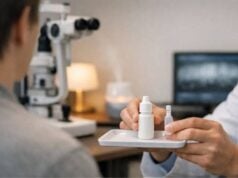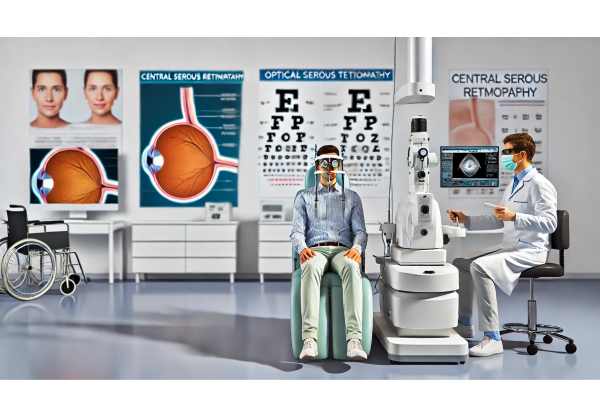
Central Serous Retinopathy (CSR) is a retinal condition that typically causes sudden, painless vision changes—often affecting people in their working years. Characterized by a buildup of fluid under the retina, CSR can lead to distorted or blurry central vision and significant visual disruption. While many cases resolve spontaneously, others become chronic or recurrent, requiring a nuanced management approach. This comprehensive guide explores the science, therapies, surgical options, and the latest advances in treating central serous retinopathy, offering patients and clinicians a roadmap for optimal care and lasting visual health.
Table of Contents
- Exploring Central Serous Retinopathy and Its Risk Factors
- Current Medical Therapies and Conservative Management
- Surgical Procedures and Interventional Options
- Innovations in Diagnosis and Emerging Technologies
- Future Directions and Upcoming Research
- Frequently Asked Questions
Exploring Central Serous Retinopathy and Its Risk Factors
Central Serous Retinopathy (CSR) is a retinal disorder where fluid accumulates beneath the retina’s central area, the macula. This buildup leads to a localized retinal detachment, blurring central vision and sometimes causing visual distortion or dark spots.
Pathophysiology and Causes:
- Mechanism: The retinal pigment epithelium (RPE) typically acts as a barrier and pump for fluid movement. In CSR, the RPE’s function is disrupted, allowing serous fluid to leak under the retina.
- Triggers: Emotional stress and elevated cortisol levels are significant contributors. Corticosteroid use—oral, topical, inhaled, or injected—is a well-known risk.
- Predisposing Factors: CSR most often affects men aged 30–50 but can impact women and older adults as well. Personality type (so-called “type A” personality), sleep disturbances, untreated hypertension, and systemic autoimmune diseases can increase susceptibility.
Prevalence and Demographics:
- Estimated prevalence is about 1 in 10,000 individuals annually, making it one of the more common retinal diseases in working-age adults.
- Recurrent or chronic forms are less common but more challenging to manage.
Clinical Presentation:
- Blurred or dim central vision in one eye (occasionally both).
- Straight lines may appear bent (metamorphopsia).
- Central gray or dark spots (scotoma).
- Colors may appear dull.
Diagnosis:
- Clinical examination and advanced imaging (OCT, fluorescein angiography, fundus autofluorescence) are used for confirmation.
Practical Advice:
If you notice changes in your central vision—especially sudden blurring or distortion—seek prompt evaluation. Early diagnosis supports the best outcomes, even for mild cases.
Current Medical Therapies and Conservative Management
Management of CSR is tailored to disease severity and chronicity. Most acute cases resolve without treatment, but targeted therapy is vital for persistent or recurrent disease.
Observation and Risk Factor Modification:
- Observation: Up to 85% of first-time cases resolve within three to four months without intervention. Vision often returns to normal or near-normal.
- Discontinue Steroids: If safe, stop corticosteroid medications under medical supervision.
- Lifestyle Adjustments: Reducing stress, improving sleep hygiene, and addressing systemic risk factors (blood pressure, sleep apnea) can aid recovery.
Medical Treatments:
- Oral Medications:
- Mineralocorticoid Receptor Antagonists: Drugs such as eplerenone and spironolactone may accelerate fluid absorption by counteracting the effects of cortisol and aldosterone.
- Other Agents: Mifepristone, acetazolamide, and beta-blockers have been studied with varying degrees of success.
- Topical or Intravitreal Medications: In select cases, topical non-steroidal anti-inflammatory drugs (NSAIDs) or off-label intravitreal anti-VEGF injections may be tried.
Chronic CSR Strategies:
- For disease lasting more than 4–6 months or with significant visual impairment, intervention is usually recommended.
Supportive Care:
- Visual Aids: For those with chronic or recurrent CSR, low vision aids and occupational therapy can enhance day-to-day functioning.
- Patient Education: Understanding triggers, recognizing early symptoms, and monitoring vision can empower patients and reduce recurrences.
Practical Advice:
Don’t hesitate to ask your eye specialist about medication risks, stress management techniques, and lifestyle changes that support retinal health.
Surgical Procedures and Interventional Options
When conservative and medical therapies fail, or CSR becomes chronic, several interventional procedures can be highly effective in restoring vision and reducing recurrence.
Laser-Based Therapies:
- Photodynamic Therapy (PDT):
- The gold standard for chronic or recurrent CSR, especially if the leak is well-defined on imaging.
- Uses a light-activated drug (verteporfin) and laser to selectively seal leaking sites.
- “Half-dose” or “half-fluence” PDT protocols lower the risk of side effects while maintaining efficacy.
- Micropulse Laser Therapy:
- Delivers laser in short bursts, minimizing retinal damage.
- Useful for subfoveal or juxtafoveal leaks where standard laser is risky.
- Traditional Focal Laser Photocoagulation:
- Reserved for extrafoveal leaks (away from the very center of vision).
Surgical Approaches:
- Surgery is rarely needed for CSR but may be considered for severe, chronic, or atypical cases—often as part of investigational studies.
- Experimental interventions, such as subretinal fluid drainage or surgical RPE patching, are explored in research settings.
Managing Complications:
- For persistent subretinal fluid or visual distortion after laser, additional imaging and repeat or adjunctive treatments may be warranted.
- Prompt intervention for rare complications (e.g., choroidal neovascularization) can prevent further visual decline.
Practical Advice:
If vision does not improve after several months, discuss advanced treatment options—including photodynamic therapy or laser—with your retina specialist.
Innovations in Diagnosis and Emerging Technologies
Rapid advances in imaging, pharmacology, and digital health are transforming the diagnosis and management of central serous retinopathy.
Cutting-Edge Diagnostics:
- Optical Coherence Tomography (OCT):
- Non-invasive, high-resolution imaging of retinal layers to precisely map fluid, track progression, and guide therapy.
- OCT Angiography:
- Visualizes retinal and choroidal blood flow without dye, aiding detection of secondary complications (e.g., neovascularization).
- Fundus Autofluorescence:
- Assesses retinal pigment epithelium health and identifies areas at risk for chronic change.
Pharmacological Innovations:
- Next-Generation Mineralocorticoid Antagonists:
- Newer drugs offer more targeted effect with fewer side effects, enhancing the safety of long-term treatment for chronic CSR.
- Novel Oral Therapies:
- Investigational medications are being tested to accelerate resolution and prevent relapse.
Digital Health and Monitoring:
- Telemedicine:
- Enables remote monitoring, patient self-reporting, and early detection of recurrence.
- Home OCT Devices:
- Allow patients to monitor retinal thickness and detect subretinal fluid at home.
AI and Predictive Analytics:
- Artificial intelligence tools now support personalized treatment planning, automated detection of recurrence, and optimization of therapy timing.
Practical Advice:
Ask your provider if advanced imaging or remote monitoring is right for you—early detection and intervention can preserve vision.
Future Directions and Upcoming Research
The landscape of CSR treatment continues to evolve, with ongoing research poised to deliver new hope for patients with persistent or complex disease.
Ongoing and Upcoming Clinical Trials:
- Novel Drug Studies:
- Phase 2 and 3 trials for advanced oral agents and next-generation mineralocorticoid antagonists.
- Gene and Cell Therapy:
- Experimental studies focus on correcting RPE dysfunction at the cellular level.
- Combination Therapies:
- Trials are exploring synergistic approaches—such as mineralocorticoid antagonists combined with laser or photodynamic therapy.
- Advanced Imaging Biomarkers:
- Research seeks to better predict which patients will develop chronic CSR and benefit from early intervention.
Big Data and Personalized Medicine:
- Collaborative registries and large data sets are helping clinicians tailor treatments to individual patient risk profiles and likely responses.
Patient-Focused Innovations:
- Wearable devices, smartphone apps, and patient communities enhance real-time monitoring, education, and support.
Global Research Efforts:
- International clinical networks are testing new drugs, devices, and protocols to expand treatment options for all patients.
Practical Advice:
Consider participating in clinical trials if eligible—doing so can grant access to cutting-edge treatments and contribute to better care for future generations.
Frequently Asked Questions
What is central serous retinopathy and who gets it?
Central serous retinopathy is a condition where fluid accumulates under the retina, causing blurred or distorted vision. It often affects men between 30 and 50 years old but can occur in women and older adults.
How is central serous retinopathy diagnosed?
Diagnosis relies on a dilated eye exam and advanced imaging, including OCT and fluorescein angiography, to visualize fluid and identify leakage points.
What is the best treatment for central serous retinopathy?
Most acute cases resolve on their own, but persistent or recurrent disease may require medications, laser therapy, or photodynamic therapy. Your eye specialist will recommend the best approach for your case.
Can central serous retinopathy cause permanent vision loss?
While many recover full vision, chronic or recurrent cases can lead to lasting visual distortion or loss. Early detection and tailored management help reduce this risk.
Are there lifestyle changes that help manage CSR?
Yes—reducing stress, managing blood pressure, improving sleep, and avoiding corticosteroids when possible may lower recurrence and support recovery.
When should I seek medical help for CSR?
Contact your eye doctor if you notice sudden changes in your central vision, as prompt assessment can prevent complications.
Disclaimer:
This guide is for informational purposes only and should not replace professional medical advice. If you have changes in vision or eye discomfort, seek evaluation by a qualified eye care provider.
If this article helped you, please share it on Facebook, X (formerly Twitter), or any platform you like. Follow us on social media for more updates and support our mission by spreading the word—your help allows us to keep creating quality health content. Thank you!


